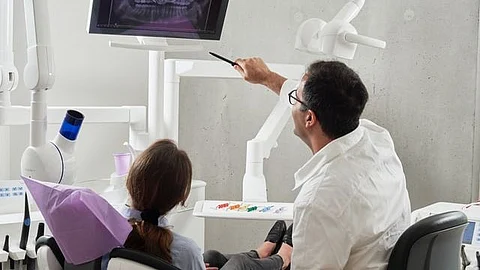

There has been a steady increase in the toll of oral cancer cases globally, in the past decade and 99 percent of these cases can be prevented if diagnosed early. In this dire need of awareness about oral cancer, we sat down with Dr B. Siva Reddy MDS, Professor of Oral & Maxillofacial Pathology at Narayana Dental College and Hospital, Nellore to get all the necessary insights.
In the previous article, we tried highlighting about the causes, prevalence and symptoms of Oral cancer. If you haven’t read it yet, here’s the link:
Here we are with the next article dealing with detection, prevention and treatment of Oral Cancer.
Harichandana(HC): Can oral cancer affect other parts of the body?
Dr.Siva Reddy: Yes, oral cancer has a potentiality to spread to other parts of the body and this phenomena is known as metastasis. Cancer cells may spread locally to adjacent soft tissues, organs or to distant sites like lungs, heart, vertebrae via blood & lymph nodes. However, studies show that this distant spread of cancer is not very common and is noticed in only advanced stages of cancer.
HC: How is oral cancer diagnosed?
Dr.Siva Reddy: There is no single test for precise diagnosis of oral cancer. It requires complete evaluation of the patient which includes intra-oral examination (8 step intra-oral screening) along with cancer screening tests like biopsy, cancer screening dye tests and optical imaging tests.
HC: Is oral cancer difficult to diagnose?
Dr.Siva Reddy: Though oral cancer is always nearly diagnosed it may go unnoticed during its early stages. Hence one's awareness about the risk factors & symptoms of oral cancer and having routine dental visits may help in early detection & diagnosis.
HC: What are the preventive measures that one should take against oral cancer?
Dr.Siva Reddy: As said "prevention is better than cure", prevention is very much important to reduce mortality & morbidity of this devastating disease. I would like to put it this way, prevention by individuals and prevention by doctors. Prevention by an individual can be accomplished by making healthy lifestyle changes like avoiding tobacco & alcohol and having fruits & vegetables rich in vitamin C and fibrous content. Getting vaccinated against HPV, and hepatitis B, approaching a doctor in case of noticing any abnormalities come under individual level prevention.
Prevention by doctors includes Chemoprevention- administration of selected synthetic or natural substances (retinol, beta carotene ) in people who have a high risk of developing cancer and initiatives like conducting cancer screening programs every 3 to 6 months.
Educating at an individual and community level regarding the signs & symptoms of cancer. Counseling the patients addressing the ill effects of tobacco & alcohol and helping in quitting the habits.
HC: What are various treatment options available for oral cancer?
Dr.Siva Reddy: There are various treatment modalities like surgical excision, chemotherapy, radiation therapy and some adjuvant therapies like immunomodulation therapy. Often these are used alone or in conjunction with each other depending on the staging & grading of cancer and patients' general health. Severe cases of malignancies often require reconstructive procedures after therapy. Finally, yet importantly, prescribing jaw exercises, and handling the complications of radiation & chemotherapy by definite recall appointments are some of the key steps for successful treatment & management.
HC: Can oral cancer reoccur after the treatment?
Dr.Siva Reddy: There are chances of recurrence and it often depends upon the patient's lifestyle & habits after treatment, staging & grading of cancer. It may also be evident due to improper management where there are remnants of cancer cells even after treatment. I would like to mention a phenomenon called field change/field cancerization which is also a potential cause of recurrence of oral cancer. In this field change, a large area of cells of a tissue undergoes alterations due to carcinogenic agents in which tissue is conditioned in such a way that often there is a recurrence of multiple neoplasms.
HC: What is the survival rate for oral cancer patients?
Dr. Siva Reddy: The survival rate of oral cancer patients often depends on various factors like age, stage of cancer, location, and the response of cancer to treatment. Studies show that stage IV cancer has a poor prognosis with just 9 percent survival rate, whereas, stage I cancer has an overall 85 percent survival rate with proper treatment and management.
MedBound Times is grateful to Dr.Siva Reddy, for taking the time out to do this interview, which will help spread awareness among the masses.
Join MedBound - an ecosystem for students and professionals of medical and health sciences.
